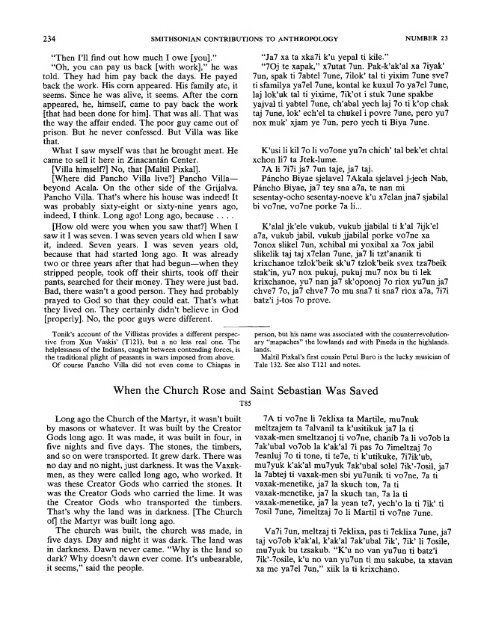PDF (Lo-Res) - Smithsonian Institution Libraries
PDF (Lo-Res) - Smithsonian Institution Libraries
PDF (Lo-Res) - Smithsonian Institution Libraries
Create successful ePaper yourself
Turn your PDF publications into a flip-book with our unique Google optimized e-Paper software.
234 SMITHSONIAN CONTRIBUTIONS TO ANTHROPOLOGY NUMBER 23<br />
"Then I'll find out how much I owe [you]."<br />
"Oh, you can pay us back [with work]," he was<br />
told. They had him pay back the days. He payed<br />
back the work. His corn appeared. His family ate, it<br />
seems. Since he was alive, it seems. After the corn<br />
appeared, he, himself, came to pay back the work<br />
[that had been done for him]. That was all. That was<br />
the way the affair ended. The poor guy came out of<br />
prison. But he never confessed. But Villa was like<br />
that.<br />
What I saw myself was that he brought meat. He<br />
came to sell it here in Zinacantan Center.<br />
[Villa himself?] No, that [Maltil Pixkal].<br />
[Where did Pancho Villa live?] Pancho Villa—<br />
beyond Acala. On the other side of the Grijalva.<br />
Pancho Villa. That's where his house was indeed! It<br />
was probably sixty-eight or sixty-nine years ago,<br />
indeed, I think. <strong>Lo</strong>ng ago! <strong>Lo</strong>ng ago, because ....<br />
[How old were you when you saw that?] When I<br />
saw it I was seven. I was seven years old when I saw<br />
it, indeed. Seven years. I was seven years old,<br />
because that had started long ago. It was already<br />
two or three years after that had begun—when they<br />
stripped people, took off their shirts, took off their<br />
pants, searched for their money. They were just bad.<br />
Bad, there wasn't a good person. They had probably<br />
prayed to God so that they could eat. That's what<br />
they lived on. They certainly didn't believe in God<br />
[properly]. No, the poor guys were different.<br />
Tonik's account of the Villistas provides a different perspective<br />
from Xun Vaskis' (T121), but a no less real one. The<br />
helplessness of the Indians, caught between contending forces, is<br />
the traditional plight of peasants in wars imposed from above.<br />
Of course Pancho Villa did not even come to Chiapas in<br />
"Ja7 xa ta xka7i k'u yepal ti kile."<br />
"7Oj te xapak," x7utat 7un. Pak-k'ak'al xa 7iyak'<br />
7un, spak ti 7abtel 7une, 7ilok' tal ti yixim 7une sve7<br />
ti sfamilya ya7el 7une, kontal ke kuxul 7o ya7el 7une,<br />
laj lok'uk tal ti yixime, 7ik'ot i stuk 7une spakbe<br />
yajval ti yabtel 7une, ch'abal yech laj 7o ti k'op chak<br />
taj 7une, lok' ech'el ta chukel i povre 7une, pero yu7<br />
nox muk' xjam ye 7un, pero yech ti Biya 7une.<br />
K'usi li kil 7o li vo7one yu7n chich' tal bek'et chtal<br />
xchon Ii7 ta Jtek-lume.<br />
7A li 7i7i ja7 7un taje, ja7 taj.<br />
Pancho Biyae sjelavel 7Akala sjelavel j-jech Nab,<br />
Pancho Biyae, ja7 tey sna a7a, te nan mi<br />
sesentay-ocho sesentay-noeve k'u x7elan jna7 sjabilal<br />
bi vo7ne, vo7ne porke 7a li...<br />
K'alal jk'ele vukub, vukub jjabilal ti k'al 7ijk'el<br />
a7a, vukub jabil, vukub jjabilal porke vo7ne xa<br />
7onox slikel 7un, xchibal mi yoxibal xa 7ox jabil<br />
slikelik taj taj x7elan 7une, ja7 li tzt'ananik ti<br />
krixchanoe tzlok'beik sk'u7 tzlok'beik svex tza7beik<br />
stak'in, yu7 nox pukuj, pukuj mu7 nox bu ti lek<br />
krixchanoe, yu7 nan ja7 sk'oponoj 7o riox yu7un ja7<br />
chve7 7o, ja7 chve7 7o mu sna7 ti sna7 riox a7a, 7i7i<br />
batz'i j-tos 7o prove.<br />
person, but his name was associated with the counterrevolutionary<br />
"mapaches" the lowlands and with Pineda in the highlands,<br />
lands.<br />
Maltil Pixkal's first cousin Petul Buro is the lucky musician of<br />
Tale 132. See also T121 and notes.<br />
When the Church Rose and Saint Sebastian Was Saved<br />
T85<br />
<strong>Lo</strong>ng ago the Church of the Martyr, it wasn't built<br />
by masons or whatever. It was built by the Creator<br />
Gods long ago. It was made, it was built in four, in<br />
five nights and five days. The stones, the timbers,<br />
and so on were transported. It grew dark. There was<br />
no day and no night, just darkness. It was the Vaxakmen,<br />
as they were called long ago, who worked. It<br />
was these Creator Gods who carried the stones. It<br />
was the Creator Gods who carried the lime. It was<br />
the Creator Gods who transported the timbers.<br />
That's why the land was in darkness. [The Church<br />
of] the Martyr was built long ago.<br />
The church was built, the church was made, in<br />
five days. Day and night it was dark. The land was<br />
in darkness. Dawn never came. "Why is the land so<br />
dark? Why doesn't dawn ever come. It's unbearable,<br />
it seems," said the people.<br />
7A ti vo7ne li 7eklixa ta Martile, mu7nuk<br />
meltzajem ta 7alvanil ta k'usitikuk ja7 la ti<br />
vaxak-men smeltzanoj ti vo7ne, chanib 7a li vo7ob la<br />
7ak'ubal vo7ob la k'ak'al 7i pas 7o 7imeltzaj 7o<br />
7eanluj 7o ti tone, ti te7e, ti k'utikuke, 7i7ik'ub,<br />
mu7yuk k'ak'al mu7yuk 7ak'ubal solel 7ik'-7osil, ja7<br />
la 7abtej ti vaxak-men sbi yu7unik ti vo7ne, 7a ti<br />
vaxak-menetike, ja7 la skuch ton, 7a ti<br />
vaxak-menetike, ja7 la skuch tan, 7a la ti<br />
vaxak-menetike, ja7 la yean te7, yech'o la ti 7ik' ti<br />
7osil 7une, 7imeltzaj 7o li Martil ti vo7ne 7une.<br />
Va7i 7un, meltzaj ti 7eklixa, pas ti 7eklixa 7une, ja7<br />
taj vo7ob k'ak'al, k'ak'al 7ak'ubal 7ik\ 7ik' li 7osile,<br />
mu7yuk bu tzsakub. "K'u no van yu7un ti batz'i<br />
7ik'-7osile, k'u no van yu7un ti mu sakube, ta xtavan<br />
xa me ya7el 7un," xiik la ti krixchano.

















